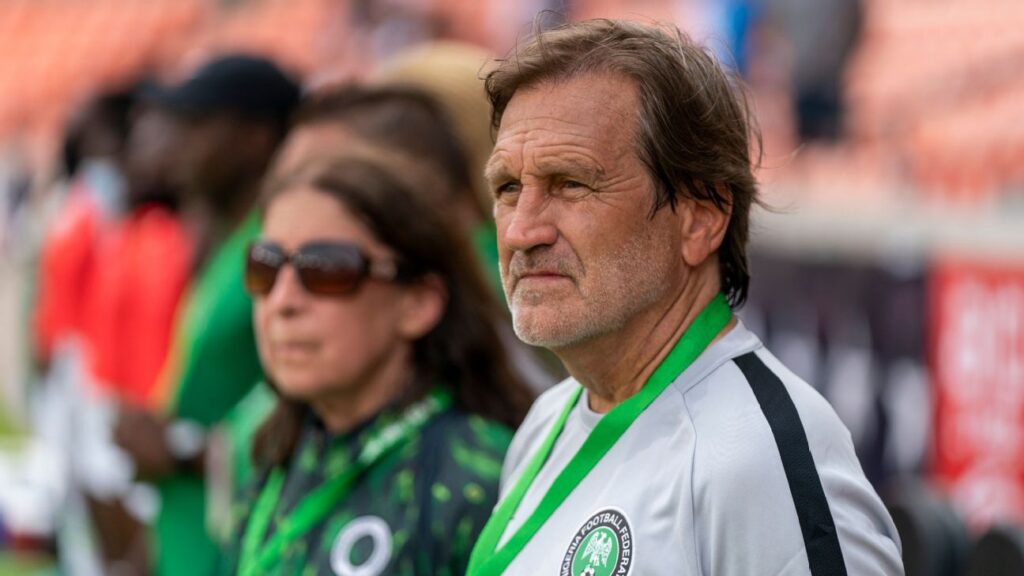Randy Waldrum’s stint as head coach of the Nigerian women’s national football team, the Super Falcons, began with great promise but ended in a cloud of uncertainty, following his resignation. His tenure, lasting just under three years, brought both high points and frustrations, with the World Cup and Olympic qualifications standing as major achievements. However, internal frictions with the Nigeria Football Federation (NFF) and inconsistency in results led to his time in Nigeria being viewed with a mixed lens.
Waldrum was appointed head coach of the Super Falcons in October 2020, replacing Swedish coach Thomas Dennerby. Waldrum, who had previously coached the Trinidad and Tobago women’s national team, came into the job with extensive experience in women’s football, including managing clubs in the U.S. Women’s Soccer League (NWSL) and a long stint at the University of Notre Dame. His resume seemed a perfect fit for the Super Falcons, and Nigerian football fans were hopeful that he would instil a new level of tactical discipline and professionalism in a team that had dominated African football but was struggling to make its mark on the global stage.
From the outset, Waldrum faced significant challenges. Nigerian football, particularly the women’s game, has historically struggled with a lack of investment and support from the football authorities. Despite their success in Africa, the Super Falcons often faced poor preparations for tournaments, inadequate facilities, and logistical difficulties. These issues persisted throughout Waldrum’s tenure, and at times, he was vocal in his criticism of the NFF for not providing the necessary backing for the team. His public airing of these grievances led to tensions with the Federation, which often created unnecessary distractions during important competitions.
Nevertheless, under Waldrum’s guidance, the Super Falcons remained competitive on the international stage. The 2023 FIFA Women’s World Cup was perhaps the defining moment of his tenure. Nigeria entered the tournament as underdogs, and many did not expect them to make a deep run, especially after a less-than-convincing African Cup of Nations campaign in 2022. However, the team surprised critics by reaching the Round of 16, putting up a valiant fight against England before eventually losing in a tense penalty shootout. The team’s disciplined defense and strategic approach were lauded, as they managed to hold the European champions to a goalless draw in regulation time. Although Nigeria exited the tournament at that stage, the performance restored some pride in the team and showed that they could compete with the best in the world when properly prepared.
This World Cup run was made all the more impressive considering the backdrop of the tournament. In the months leading up to the competition, the team faced several issues off the pitch. Reports of unpaid salaries, inadequate training facilities, and other logistical challenges plagued their preparations. At one point, there were reports that the players planned to boycott their opening match in protest over these issues. Waldrum was put in the difficult position of balancing his public support for his players with his responsibilities as coach. Ultimately, the team decided to play, and their performances in the group stages, including a memorable victory against Australia, were hailed as a triumph of will and determination.
Despite these successes, Waldrum’s tenure was far from smooth. The team’s performance at the 2022 Women’s Africa Cup of Nations (WAFCON) was a significant low point. Having won the tournament a record nine times, Nigeria was expected to dominate again. However, they finished in a disappointing fourth place, losing to both Morocco in the semi-finals and Zambia in the third-place playoff. The team’s lacklustre showing led to criticism of Waldrum’s tactical decisions and his failure to get the best out of key players, including Asisat Oshoala, who struggled with her form and injuries throughout the tournament. This failure to win WAFCON, a tournament Nigeria had historically dominated, raised questions about Waldrum’s long-term suitability for the job.
Another significant challenge during Waldrum’s tenure was his relationship with the NFF. Throughout his time in charge, there were frequent reports of disagreements between the coach and the Federation, particularly over issues of funding and player welfare. Waldrum did not shy away from criticising the NFF in the media, accusing them of failing to provide adequate support for the team. These public spats often overshadowed the team’s performances on the pitch and contributed to a sense of instability around the national team setup.
Despite these challenges, Waldrum did achieve one significant milestone that will be a part of his legacy: guiding the Super Falcons to qualify for the 2024 Paris Olympics. Nigeria had missed out on the last two Olympic Games, and securing qualification was seen as a crucial step in restoring the team’s status as one of the elite sides in women’s football. Waldrum’s ability to guide the team through the qualification process, despite the ongoing issues with the NFF, was a testament to his coaching abilities even if their participation in the Games in Paris, France, left much to be desired.
Having gone through those two international competitions, Waldrum believed he was better off handing off the responsibility of leading the team and announced his resignation from the post. While official reasons were cited as personal, including his wife’s health concerns, it is hard to ignore the friction between Waldrum and the NFF as a contributing factor. His departure leaves a sense of unfinished business. While he succeeded in restoring some pride in the Super Falcons, particularly with their World Cup run and Olympic qualification, the team’s inconsistencies, internal conflicts, and underwhelming performances in continental competitions mean that Waldrum’s tenure will be viewed with mixed emotions.
As Nigeria looks beyond the Waldrum era, the NFF must now find a new coach capable of building on the foundation that Waldrum has left. His time in charge highlighted the enormous potential of Nigerian women’s football but also underscored the systemic issues that continue to hold the team back. With the right support and investment, there is no reason why the Super Falcons cannot become a force to be reckoned with on the global stage. However, for that to happen, the NFF must learn from the lessons of Waldrum’s tenure and provide the next coach with the resources and backing necessary to take the team to the next level.
Waldrum’s tenure was far from perfect, but it provided a glimpse of what could be achieved with proper planning and support. His exit marks the end of a mixed chapter in Nigerian women’s football, but it also presents an opportunity for a fresh start. The Super Falcons remain Africa’s most successful women’s team, and with the right leadership, they have the potential to achieve even greater heights.








More Stories
Amorim insists Fernandes not leaving Manchester United amid Madrid reports
How debt burden pushed Nigerian boxer Segun Olanrewaju to a fight that took his life
Nigeria Taekwondo Federation boss, Abdullahi Saidu dies at 53